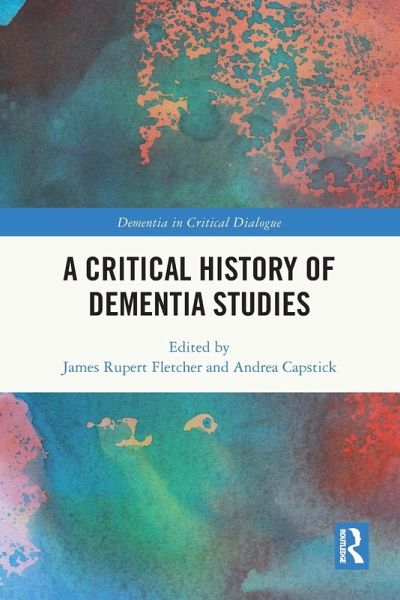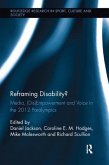A Critical History of Dementia Studies
Herausgeber: Fletcher, James Rupert; Capstick, Andrea
A Critical History of Dementia Studies
Herausgeber: Fletcher, James Rupert; Capstick, Andrea
- Broschiertes Buch
- Merkliste
- Auf die Merkliste
- Bewerten Bewerten
- Teilen
- Produkt teilen
- Produkterinnerung
- Produkterinnerung
This book offers the first ever critical history of dementia studies.
Andere Kunden interessierten sich auch für
![Reframing Disability? Reframing Disability?]() Reframing Disability?75,99 €
Reframing Disability?75,99 €![Disability in Medieval Europe Disability in Medieval Europe]() Irina MetzlerDisability in Medieval Europe72,99 €
Irina MetzlerDisability in Medieval Europe72,99 €![Epidemic Malaria and Hunger in Colonial Punjab Epidemic Malaria and Hunger in Colonial Punjab]() Sheila ZurbriggEpidemic Malaria and Hunger in Colonial Punjab67,99 €
Sheila ZurbriggEpidemic Malaria and Hunger in Colonial Punjab67,99 €![Silent Life and Silent Language: The Inner Life of a Mute in an Institution for the Deaf Volume 11 Silent Life and Silent Language: The Inner Life of a Mute in an Institution for the Deaf Volume 11]() Kate M. FarlowSilent Life and Silent Language: The Inner Life of a Mute in an Institution for the Deaf Volume 1137,99 €
Kate M. FarlowSilent Life and Silent Language: The Inner Life of a Mute in an Institution for the Deaf Volume 1137,99 €![Research In Psychotherapy Research In Psychotherapy]() Hans H. StruppResearch In Psychotherapy29,99 €
Hans H. StruppResearch In Psychotherapy29,99 €![Group Psychotherapy Group Psychotherapy]() Moreno MorenoGroup Psychotherapy27,99 €
Moreno MorenoGroup Psychotherapy27,99 €![Dementia Praecox Dementia Praecox]() Adolf MeyerDementia Praecox18,99 €
Adolf MeyerDementia Praecox18,99 €-
-
-
This book offers the first ever critical history of dementia studies.
Hinweis: Dieser Artikel kann nur an eine deutsche Lieferadresse ausgeliefert werden.
Hinweis: Dieser Artikel kann nur an eine deutsche Lieferadresse ausgeliefert werden.
Produktdetails
- Produktdetails
- Verlag: Taylor & Francis
- Seitenzahl: 200
- Erscheinungstermin: 18. Dezember 2024
- Englisch
- Abmessung: 230mm x 151mm x 13mm
- Gewicht: 336g
- ISBN-13: 9781032268828
- ISBN-10: 1032268824
- Artikelnr.: 72107334
- Herstellerkennzeichnung
- Libri GmbH
- Europaallee 1
- 36244 Bad Hersfeld
- gpsr@libri.de
- Verlag: Taylor & Francis
- Seitenzahl: 200
- Erscheinungstermin: 18. Dezember 2024
- Englisch
- Abmessung: 230mm x 151mm x 13mm
- Gewicht: 336g
- ISBN-13: 9781032268828
- ISBN-10: 1032268824
- Artikelnr.: 72107334
- Herstellerkennzeichnung
- Libri GmbH
- Europaallee 1
- 36244 Bad Hersfeld
- gpsr@libri.de
James Rupert Fletcher is a Wellcome fellow in the Department of Sociology at the University of Manchester, UK. His research covers several areas of the dementia economy, with an emphasis on using social theory and methods to understand dementia as a political entity. He has published on subjects including informal dementia care networks, mental capacity legislation and its influence on research governance, the anti-ageing technoscience market, anti-stigma and awareness raising campaigns regarding psychiatric disorder, the operationalisation of ethnicity and age in research, the biomarker discovery economy, the curation of dementia-friendly cultural events, dementia prevention public health strategies and environmental effects on cognition in urban settings. His lecturing spans medical sociology, the sociology of ageing, social research methods and ethical governance. Andrea Capstick is an associate professor at the University of Bradford School of Dementia Studies. She originally worked alongside the late Professor Tom Kitwood to develop the first distance learning programme in dementia studies. Since then, she has at different times led both the BSc (Hons) and the MSc programmes in dementia studies at the University of Bradford. She holds a Doctorate in Education (EdD) for her work on the use of film and narrative biography in teaching dementia studies, and has published on a variety of subjects including participatory visual methods, arts-based approaches to teaching and learning, the representation of people with dementia in the popular media and dementia as a human rights issue. She has undertaken research funded by the NIHR (2012-15) on the impact of participatory filmmaking on social inclusion and well-being for people with dementia in long-term care, and more recently on the study 'What works in dementia education and training?' (2015-18) where she led the Patient and Public Involvement (PPI) work.
Introduction
Part I: Paradigms
1. Pathologisation, (bio)medicalisation & biopolitics
2. The century without a war: Kitwood's concept of malignant social psychology and the need for historicisation in dementia studies
Part II: Discourses
3. Language about people with dementia
4. A Semiotic analysis of meanings of dementia around the world
5. Literary dementia studies: from managing estrangement to imaginatively reconceptualizing forgetfulness
Part III: Intersectionalities
6. Gender awareness and feminist approaches in dementia studies
7. "On my good days, I can [...] almost pass for a normal person": reading the film Still Alice using the conceptual lens of heteronormativity
8. Race, ethnicity and culture: problematic application in dementia and old age
Part IV: Methodologies
9. 'Whose story is it and what is it for?': Life story as critical discourse in dementia studies
10. From symptoms to citizenship: A critical reading of the perceived value of arts and culture in a dementia context
Part V: Politics
11. Human rights & dementia: a 'socratic dialogue'
12. Experts by experience: "I don't want to be shaken, I want to be a shaker"
Conclusion: multi-disciplinary, multi-historied, multi-critical
Part I: Paradigms
1. Pathologisation, (bio)medicalisation & biopolitics
2. The century without a war: Kitwood's concept of malignant social psychology and the need for historicisation in dementia studies
Part II: Discourses
3. Language about people with dementia
4. A Semiotic analysis of meanings of dementia around the world
5. Literary dementia studies: from managing estrangement to imaginatively reconceptualizing forgetfulness
Part III: Intersectionalities
6. Gender awareness and feminist approaches in dementia studies
7. "On my good days, I can [...] almost pass for a normal person": reading the film Still Alice using the conceptual lens of heteronormativity
8. Race, ethnicity and culture: problematic application in dementia and old age
Part IV: Methodologies
9. 'Whose story is it and what is it for?': Life story as critical discourse in dementia studies
10. From symptoms to citizenship: A critical reading of the perceived value of arts and culture in a dementia context
Part V: Politics
11. Human rights & dementia: a 'socratic dialogue'
12. Experts by experience: "I don't want to be shaken, I want to be a shaker"
Conclusion: multi-disciplinary, multi-historied, multi-critical
Introduction
Part I: Paradigms
1. Pathologisation, (bio)medicalisation & biopolitics
2. The century without a war: Kitwood's concept of malignant social psychology and the need for historicisation in dementia studies
Part II: Discourses
3. Language about people with dementia
4. A Semiotic analysis of meanings of dementia around the world
5. Literary dementia studies: from managing estrangement to imaginatively reconceptualizing forgetfulness
Part III: Intersectionalities
6. Gender awareness and feminist approaches in dementia studies
7. "On my good days, I can [...] almost pass for a normal person": reading the film Still Alice using the conceptual lens of heteronormativity
8. Race, ethnicity and culture: problematic application in dementia and old age
Part IV: Methodologies
9. 'Whose story is it and what is it for?': Life story as critical discourse in dementia studies
10. From symptoms to citizenship: A critical reading of the perceived value of arts and culture in a dementia context
Part V: Politics
11. Human rights & dementia: a 'socratic dialogue'
12. Experts by experience: "I don't want to be shaken, I want to be a shaker"
Conclusion: multi-disciplinary, multi-historied, multi-critical
Part I: Paradigms
1. Pathologisation, (bio)medicalisation & biopolitics
2. The century without a war: Kitwood's concept of malignant social psychology and the need for historicisation in dementia studies
Part II: Discourses
3. Language about people with dementia
4. A Semiotic analysis of meanings of dementia around the world
5. Literary dementia studies: from managing estrangement to imaginatively reconceptualizing forgetfulness
Part III: Intersectionalities
6. Gender awareness and feminist approaches in dementia studies
7. "On my good days, I can [...] almost pass for a normal person": reading the film Still Alice using the conceptual lens of heteronormativity
8. Race, ethnicity and culture: problematic application in dementia and old age
Part IV: Methodologies
9. 'Whose story is it and what is it for?': Life story as critical discourse in dementia studies
10. From symptoms to citizenship: A critical reading of the perceived value of arts and culture in a dementia context
Part V: Politics
11. Human rights & dementia: a 'socratic dialogue'
12. Experts by experience: "I don't want to be shaken, I want to be a shaker"
Conclusion: multi-disciplinary, multi-historied, multi-critical








